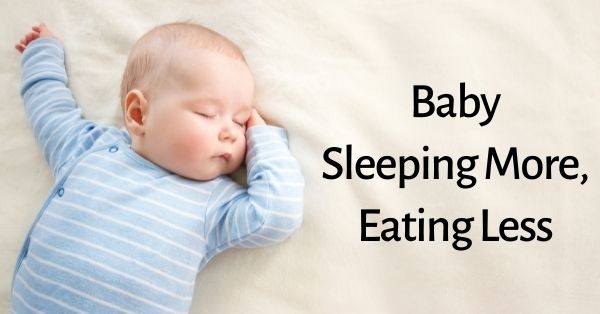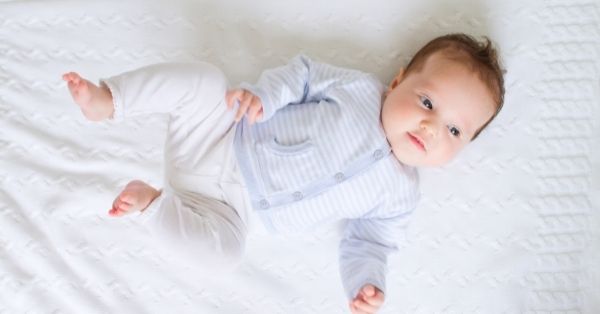Your baby is a few months old. By now, you are used to waking up countless times during the night to breastfeed her. Feeding pretty often and has short regular sleeping intervals. Then suddenly, the opposite happens. Your munchkin sleeps more and wakes up to feed minimal times.
This change of routine could be worrying. It’s worse for first-time parents since they aren’t sure if the baby is ill. You’re justified to panic about the baby sleeping more and eating less.
What causes this change in the eating-sleeping pattern?
Read on to find out what causes the pattern, what you can do and when to contact your pediatrician.

Baby Sleeping More Eating Less – Why?
A baby may sleep more and eat less due to cognitive leaps, growth spurts, teething, and development of defined sleeping patterns, better intake of nutrients from solid foods, illness and recent vaccinations.
This change in sleeping patterns is often nothing to cause worry. However, if you find it unusually disturbing, contact your pediatrician for medical advice. Either way, enjoy the intrigues of your growing baby before they pass.
Sleeping And Eating Schedules In Babies: What’s Normal?
It’s normal for newborns to sleep a lot, wake up to feed quite often and develop a defined sleep pattern by six months. Further, having mixed days/ nights and rarely sleeping throughout the night is another usual trend in babies.
Usually, healthy babies feed regularly, eat less as they grow older, give hunger cues when they want to feed, swallow some air hence need burping and also have a way to signal that they are full. That said, remember, every baby is unique.
It’s OK if they have a different feeding or sleeping pattern. It’s justifiable to wonder,” why is my baby eating and sleeping less?” Anything outside the standard warrants the immediate attention of your doctor. However, give your little one time as it may be a healthy part of development.
7 Reasons Why Your Baby Eating Less And Sleeping More
For any parent, any change in growth trends in their babies could cause worry. Increased sleep and less food intake are part of normal development in children. If there are no other symptoms such as fever, flu or coughs, your baby is doing fine.
What may make a baby eat less and sleep more? The following are possible reasons:
- Your little one is going through a cognitive leap
Like physical development, cognitive leaps are exhausting, making your baby want to rest more for a few days.
The baby may sleep longer or take short, frequent naps. You may not notice any physical milestones after, but he will have improved cognitive skills.
- Could be experiencing a growth spurt.
Growing up takes hard work. Any development may take a toll on your baby’s tiny body. Growth spurts bring noticeable physical changes, including growth in size. When your little one sleeps more, he may feel drained from the ongoing growth and development.
Research by PubMed Central found a connection between rapid physical growth and development in sleep organization during the first six months of life. Sleeping is a form of rest that babies need when experiencing growth spurts.
You may not notice instantly, but expect to return to the baby shop as they may get bigger and heavier after the process.
- Could be in the process of teething.
Teething presents a discomfort that may lead to interrupted sleeping and eating routines. The change starts long before noticing teeth.
If your baby has been sleepy lately, observe him for signs of teething, such as:
- Ear or cheek rubbing/ear pulling
- Unusual drooling
- Desire to bite on things to soothe their itchy gums
- Reduced appetite and poor feeding pattern
- Excessive sleepiness
Increased sleeping is common among most teething babies. Conversely, some babies may sleep less due to discomfort. Contact your healthcare provider if your baby has been sleeping more and no teeth are popping yet.
If you observe additional signs, including fever, a runny nose, diaper rashes and diarrhea, your baby could be ill. Teething isn’t associated with such symptoms.
- Your baby is defining his sleeping pattern.
As your baby grows, they level out many aspects of its life. The little one’s new sleeping and eating pattern show they’re developing a more predictable napping routine. Soon, they will have a sleep cycle that befits him. This is good news as you will have a better night’s rest.
- Recent Vaccination or medication
While vaccinations help in protecting your baby from diseases, they have side effects like sleepiness, fever and loss of appetite. After undergoing a vaccination, sleeping is a way of alleviating discomfort. The CDC found any vaccine has a possibility of causing side effects like low-grade fever and fatigue.
Additionally, some infant medications are notorious for causing drowsiness. The sleeping pattern lasts only a few days or hours, after which they’ll return to normal.
- Your baby may be getting satisfied from nutrients in solid foods
Babies receive new solid foods with mixed reactions. If your munchkin loves solid weaning foods, they may get fuller and sleep longer.
- Baby may be dealing with an illness.
Due to their tiny body size, fighting an illness or infection takes effort. For quick recovery, the body needs more sleep and rest. You may notice a loss in appetite as well. That’s normal. Feed your baby small amounts of food and fruit regularly.
All the reasons I have explained could be responsible for the new sleeping pattern. If the new sleep routine lasts for months, visit your doctor for medical advice.

Baby Sleeping More Than Usual And Eating Less – What To Do?
Often, newborn babies sleep up to 17 hours. But, when they nap over mealtimes and doesn’t show any desire to eat, it should be a cause for alarm.
Before contacting your pediatrician, try the following:
- Watch out for signs of hunger and feed him well
It’s best to feed your munchkin every time they wake up, showing hunger cues. Please take advantage of his hunger pangs to give him more to eat.
- Keep your baby at the right temperature. Not too warm or excessively cold
Room temperature keeps your little one comfortable while sleeping. Ensure they sleep in a room with good air circulation too. This way, they’ll sleep well and wake up to eat when ready.
- Try breastfeeding or bottle-feeding him after every two-three hours.
When your little one oversleeps and doesn’t feed well, they may be deprived of crucial nutrients. Waking up a sleeping baby isn’t easy. Be creative about it. Avoid waking them up when he’s deeply asleep, as you may interfere with the ongoing development process.
- Create a sleeping log to track your baby’s sleeping routine
A sleep log helps you to monitor your little one’s sleeping pattern. Establishing if they are oversleeping before going to your doctor is necessary. Give them time to go back to his routine.
When Is It Time To See A Doctor?
Increased sleep is not uncommon among newborn babies. However, you should be concerned if you note danger signs such as:
- loud, irregular breathing
- Difficulty in breathing or wheezing sounds
- Flaring nostrils when breathing
- Persistent fever above 100 degrees in newborns
- A sinking skin around the baby’s ribs when breathing
- A runny nose
- Vomiting and diarrhea
- Dark-colored urine, sunken eyes and other signs of dehydration
Aside from looking out for the above symptoms, always follow your gut instincts. Call your doctor anytime you feel worried about your baby’s sleeping and eating patterns.
Babies are unpredictable. They may present one symptom while, in reality, suffering from another condition.

How Much Sleep Is OK For Babies?
While every child is unique, there’s a range that defines regular sleeping hours. The sleep foundation recommends 14-17 hours for 0-3-month-old newborns, 11-15 hours for 4-11 months infants, and 11-14 hours of sleep for 1-2 years old toddlers.
They may only sleep for a short time. The hours could be split into 1- 2 hours of nap chunks spread throughout the day and night. Any sleep extension outside the recommendations may be a symptom of an underlying condition.
Wrapping Up
Let’s look at a few points to summarize the baby sleeping more and eating less.
The daily recommended sleeping hours for newborns is 11-17 hours. However, it’s healthy if your munchkin sleeps more during physical and mental development.
Growth spurts, cognitive leaps, illness, vaccinations and teething are some causes of extra sleepiness in babies. Aside from illness, sleepiness caused by other factors normalizes over time.
Before rushing to your doctor, feeding your munchkin soon they shows hunger cues, creating a sleep log to track the sleeping routine and trying to feed your baby regularly are things you can do at home if the baby is sleeping more.
Call your doctor if you’re still concerned about your baby sleeping a lot and eating less.
More to read: